Annotated Bibliography: Citizen Soldiers in International Relations
VerifiedAdded on 2023/06/14
|7
|1640
|155
Annotated Bibliography
AI Summary
This annotated bibliography explores key themes in international relations, focusing on the role of the citizen-soldier and the impact of war on society and political culture. It analyzes four academic articles, each providing a unique perspective on historical events and their lasting consequences. The readings cover topics such as the divergence of women's citizenship after World War I, French testimonies of massacres during the Napoleonic and Revolutionary Wars, the rise of citizen-soldiers in the American military, and the tradition of the citizen-soldier in the United States. The bibliography connects these readings to the author's approach of examining the transformation during and after the nineteenth century, highlighting the experiences and perspectives of both soldiers and civilians during wartime. This resource provides valuable insights into the complexities of international relations and the enduring impact of historical events.
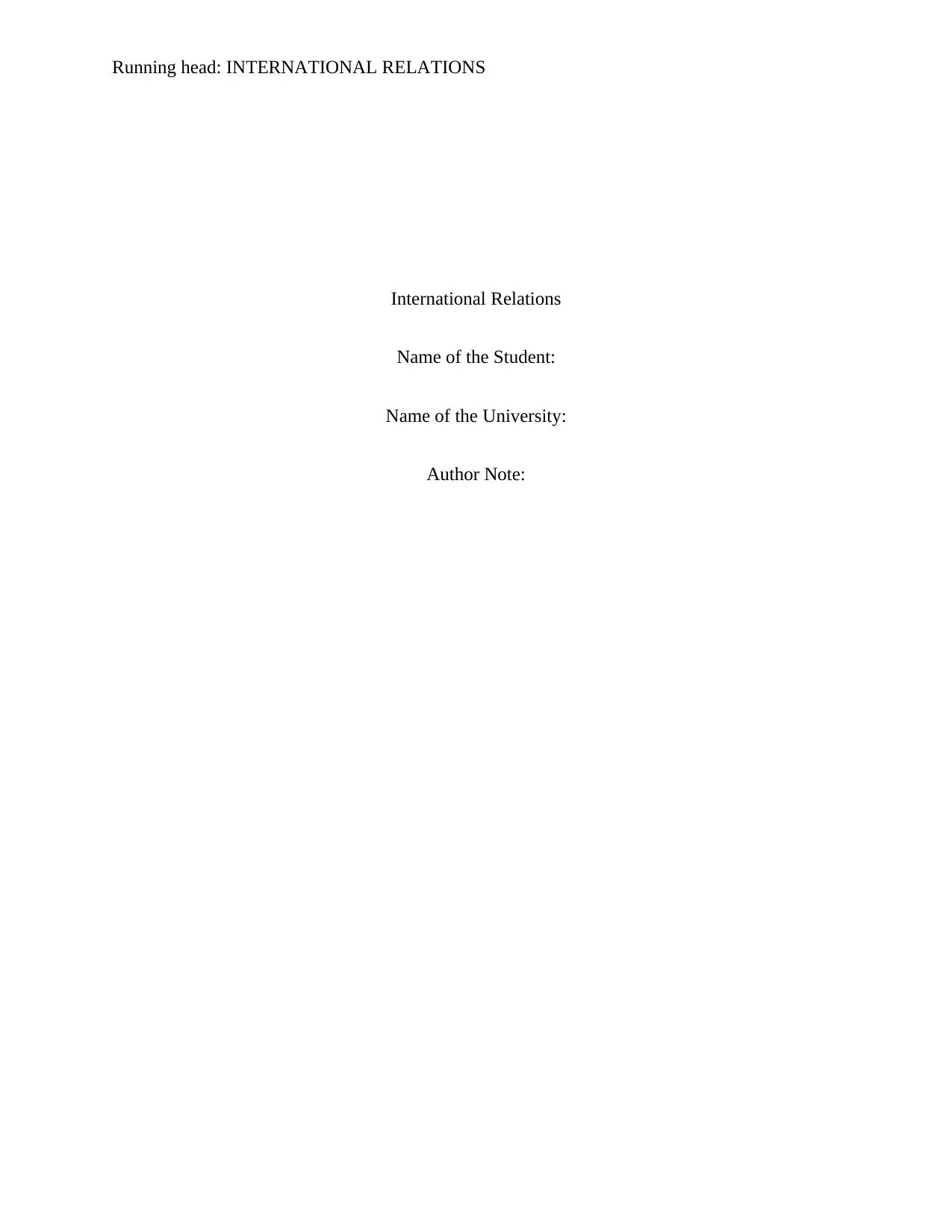
Running head: INTERNATIONAL RELATIONS
International Relations
Name of the Student:
Name of the University:
Author Note:
International Relations
Name of the Student:
Name of the University:
Author Note:
Paraphrase This Document
Need a fresh take? Get an instant paraphrase of this document with our AI Paraphraser
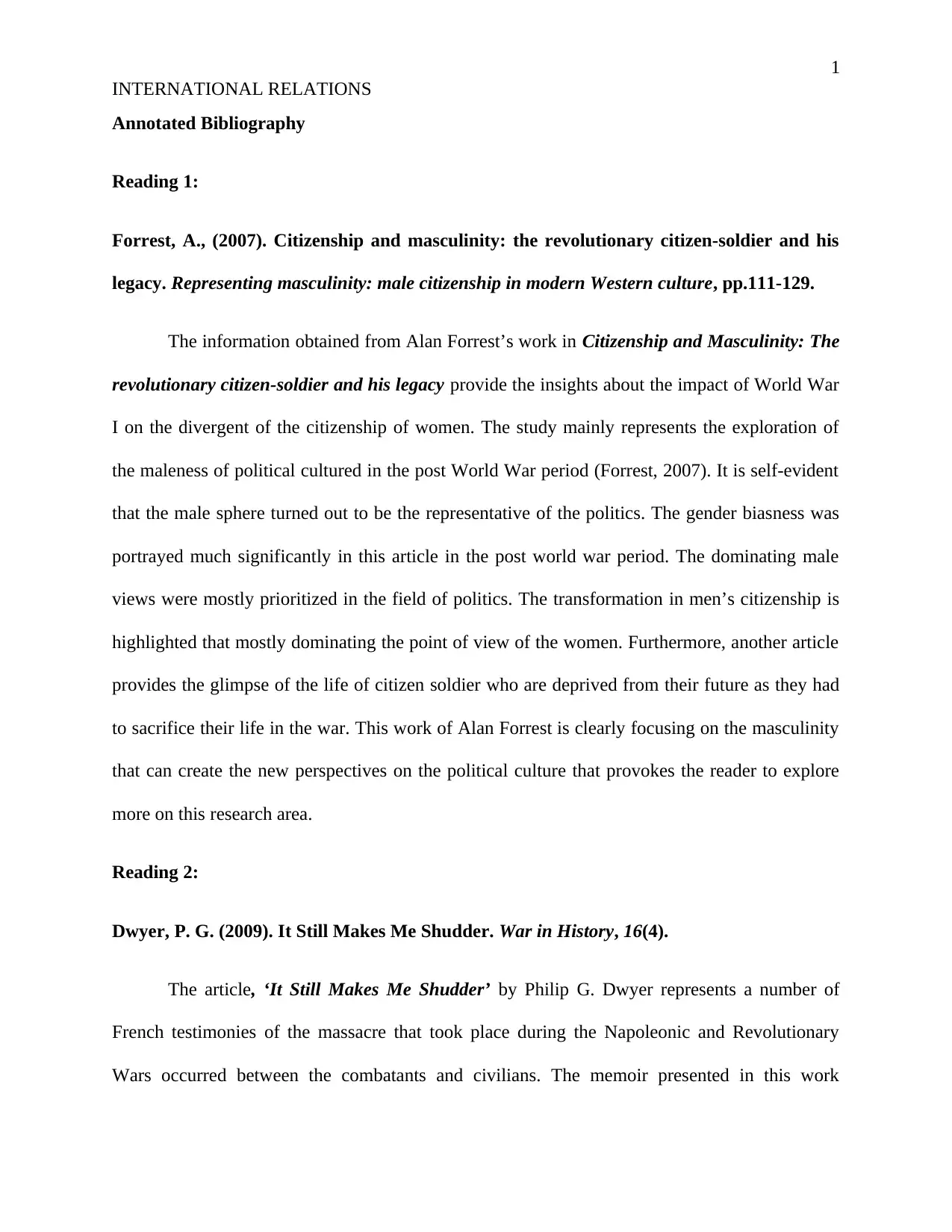
1
INTERNATIONAL RELATIONS
Annotated Bibliography
Reading 1:
Forrest, A., (2007). Citizenship and masculinity: the revolutionary citizen-soldier and his
legacy. Representing masculinity: male citizenship in modern Western culture, pp.111-129.
The information obtained from Alan Forrest’s work in Citizenship and Masculinity: The
revolutionary citizen-soldier and his legacy provide the insights about the impact of World War
I on the divergent of the citizenship of women. The study mainly represents the exploration of
the maleness of political cultured in the post World War period (Forrest, 2007). It is self-evident
that the male sphere turned out to be the representative of the politics. The gender biasness was
portrayed much significantly in this article in the post world war period. The dominating male
views were mostly prioritized in the field of politics. The transformation in men’s citizenship is
highlighted that mostly dominating the point of view of the women. Furthermore, another article
provides the glimpse of the life of citizen soldier who are deprived from their future as they had
to sacrifice their life in the war. This work of Alan Forrest is clearly focusing on the masculinity
that can create the new perspectives on the political culture that provokes the reader to explore
more on this research area.
Reading 2:
Dwyer, P. G. (2009). It Still Makes Me Shudder. War in History, 16(4).
The article, ‘It Still Makes Me Shudder’ by Philip G. Dwyer represents a number of
French testimonies of the massacre that took place during the Napoleonic and Revolutionary
Wars occurred between the combatants and civilians. The memoir presented in this work
INTERNATIONAL RELATIONS
Annotated Bibliography
Reading 1:
Forrest, A., (2007). Citizenship and masculinity: the revolutionary citizen-soldier and his
legacy. Representing masculinity: male citizenship in modern Western culture, pp.111-129.
The information obtained from Alan Forrest’s work in Citizenship and Masculinity: The
revolutionary citizen-soldier and his legacy provide the insights about the impact of World War
I on the divergent of the citizenship of women. The study mainly represents the exploration of
the maleness of political cultured in the post World War period (Forrest, 2007). It is self-evident
that the male sphere turned out to be the representative of the politics. The gender biasness was
portrayed much significantly in this article in the post world war period. The dominating male
views were mostly prioritized in the field of politics. The transformation in men’s citizenship is
highlighted that mostly dominating the point of view of the women. Furthermore, another article
provides the glimpse of the life of citizen soldier who are deprived from their future as they had
to sacrifice their life in the war. This work of Alan Forrest is clearly focusing on the masculinity
that can create the new perspectives on the political culture that provokes the reader to explore
more on this research area.
Reading 2:
Dwyer, P. G. (2009). It Still Makes Me Shudder. War in History, 16(4).
The article, ‘It Still Makes Me Shudder’ by Philip G. Dwyer represents a number of
French testimonies of the massacre that took place during the Napoleonic and Revolutionary
Wars occurred between the combatants and civilians. The memoir presented in this work
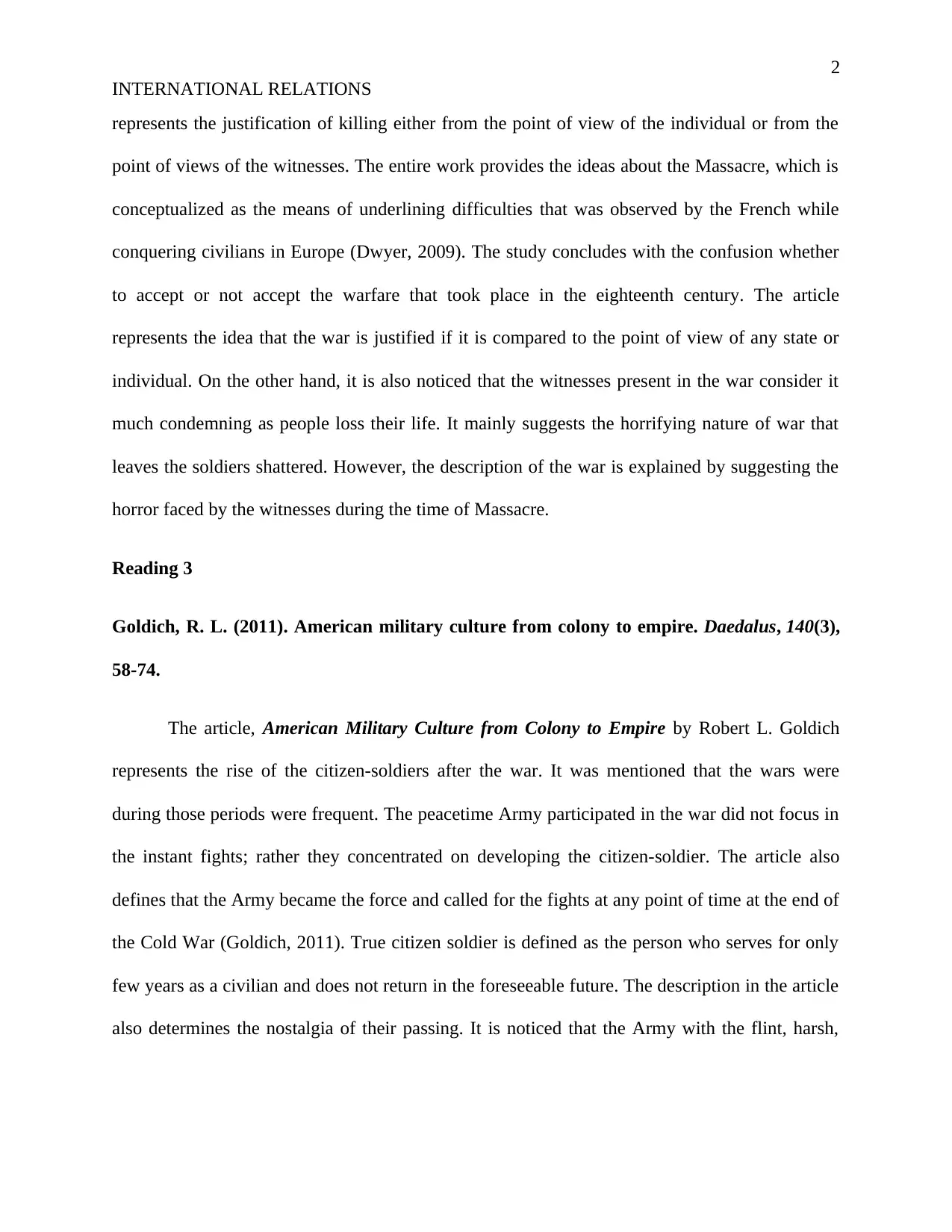
2
INTERNATIONAL RELATIONS
represents the justification of killing either from the point of view of the individual or from the
point of views of the witnesses. The entire work provides the ideas about the Massacre, which is
conceptualized as the means of underlining difficulties that was observed by the French while
conquering civilians in Europe (Dwyer, 2009). The study concludes with the confusion whether
to accept or not accept the warfare that took place in the eighteenth century. The article
represents the idea that the war is justified if it is compared to the point of view of any state or
individual. On the other hand, it is also noticed that the witnesses present in the war consider it
much condemning as people loss their life. It mainly suggests the horrifying nature of war that
leaves the soldiers shattered. However, the description of the war is explained by suggesting the
horror faced by the witnesses during the time of Massacre.
Reading 3
Goldich, R. L. (2011). American military culture from colony to empire. Daedalus, 140(3),
58-74.
The article, American Military Culture from Colony to Empire by Robert L. Goldich
represents the rise of the citizen-soldiers after the war. It was mentioned that the wars were
during those periods were frequent. The peacetime Army participated in the war did not focus in
the instant fights; rather they concentrated on developing the citizen-soldier. The article also
defines that the Army became the force and called for the fights at any point of time at the end of
the Cold War (Goldich, 2011). True citizen soldier is defined as the person who serves for only
few years as a civilian and does not return in the foreseeable future. The description in the article
also determines the nostalgia of their passing. It is noticed that the Army with the flint, harsh,
INTERNATIONAL RELATIONS
represents the justification of killing either from the point of view of the individual or from the
point of views of the witnesses. The entire work provides the ideas about the Massacre, which is
conceptualized as the means of underlining difficulties that was observed by the French while
conquering civilians in Europe (Dwyer, 2009). The study concludes with the confusion whether
to accept or not accept the warfare that took place in the eighteenth century. The article
represents the idea that the war is justified if it is compared to the point of view of any state or
individual. On the other hand, it is also noticed that the witnesses present in the war consider it
much condemning as people loss their life. It mainly suggests the horrifying nature of war that
leaves the soldiers shattered. However, the description of the war is explained by suggesting the
horror faced by the witnesses during the time of Massacre.
Reading 3
Goldich, R. L. (2011). American military culture from colony to empire. Daedalus, 140(3),
58-74.
The article, American Military Culture from Colony to Empire by Robert L. Goldich
represents the rise of the citizen-soldiers after the war. It was mentioned that the wars were
during those periods were frequent. The peacetime Army participated in the war did not focus in
the instant fights; rather they concentrated on developing the citizen-soldier. The article also
defines that the Army became the force and called for the fights at any point of time at the end of
the Cold War (Goldich, 2011). True citizen soldier is defined as the person who serves for only
few years as a civilian and does not return in the foreseeable future. The description in the article
also determines the nostalgia of their passing. It is noticed that the Army with the flint, harsh,
⊘ This is a preview!⊘
Do you want full access?
Subscribe today to unlock all pages.

Trusted by 1+ million students worldwide
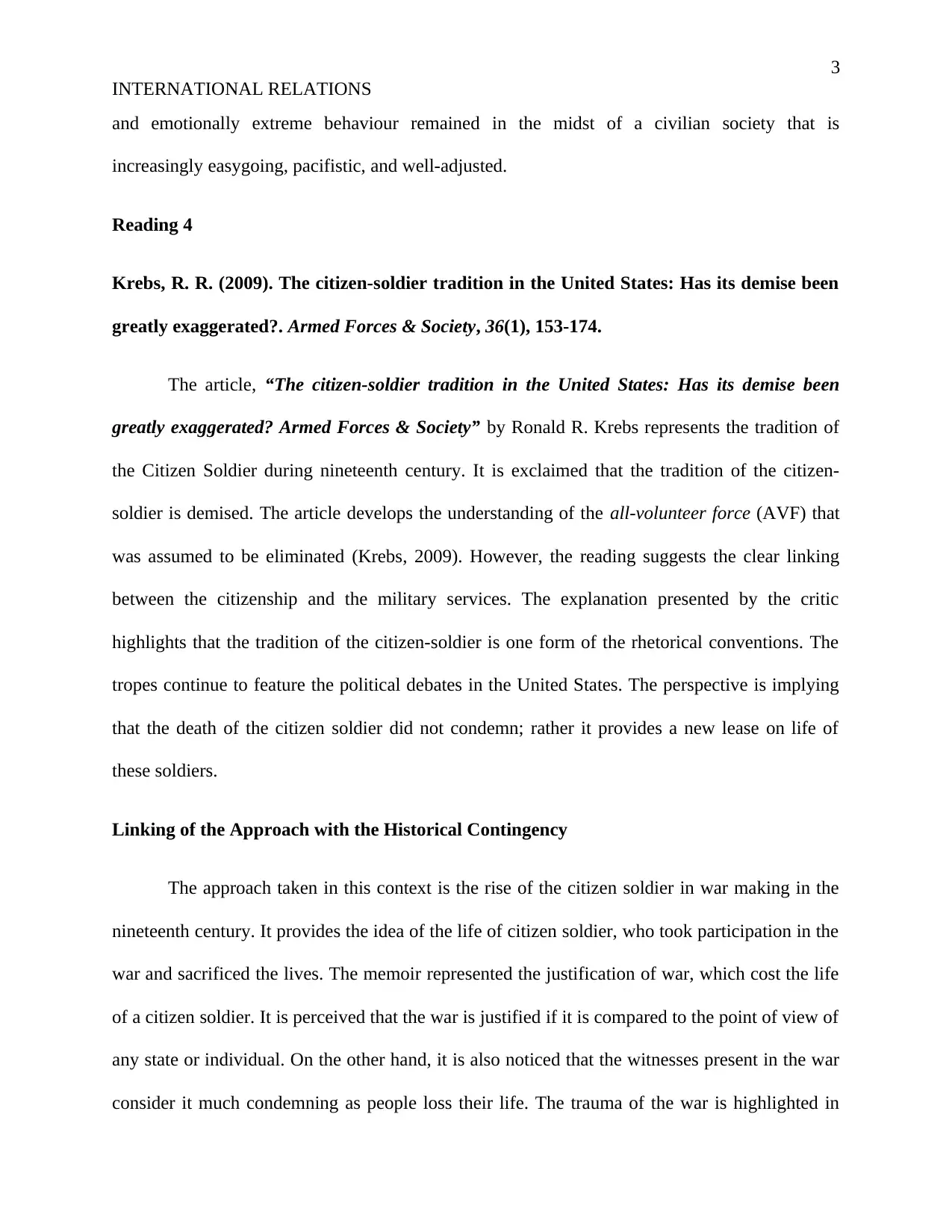
3
INTERNATIONAL RELATIONS
and emotionally extreme behaviour remained in the midst of a civilian society that is
increasingly easygoing, pacifistic, and well-adjusted.
Reading 4
Krebs, R. R. (2009). The citizen-soldier tradition in the United States: Has its demise been
greatly exaggerated?. Armed Forces & Society, 36(1), 153-174.
The article, “The citizen-soldier tradition in the United States: Has its demise been
greatly exaggerated? Armed Forces & Society” by Ronald R. Krebs represents the tradition of
the Citizen Soldier during nineteenth century. It is exclaimed that the tradition of the citizen-
soldier is demised. The article develops the understanding of the all-volunteer force (AVF) that
was assumed to be eliminated (Krebs, 2009). However, the reading suggests the clear linking
between the citizenship and the military services. The explanation presented by the critic
highlights that the tradition of the citizen-soldier is one form of the rhetorical conventions. The
tropes continue to feature the political debates in the United States. The perspective is implying
that the death of the citizen soldier did not condemn; rather it provides a new lease on life of
these soldiers.
Linking of the Approach with the Historical Contingency
The approach taken in this context is the rise of the citizen soldier in war making in the
nineteenth century. It provides the idea of the life of citizen soldier, who took participation in the
war and sacrificed the lives. The memoir represented the justification of war, which cost the life
of a citizen soldier. It is perceived that the war is justified if it is compared to the point of view of
any state or individual. On the other hand, it is also noticed that the witnesses present in the war
consider it much condemning as people loss their life. The trauma of the war is highlighted in
INTERNATIONAL RELATIONS
and emotionally extreme behaviour remained in the midst of a civilian society that is
increasingly easygoing, pacifistic, and well-adjusted.
Reading 4
Krebs, R. R. (2009). The citizen-soldier tradition in the United States: Has its demise been
greatly exaggerated?. Armed Forces & Society, 36(1), 153-174.
The article, “The citizen-soldier tradition in the United States: Has its demise been
greatly exaggerated? Armed Forces & Society” by Ronald R. Krebs represents the tradition of
the Citizen Soldier during nineteenth century. It is exclaimed that the tradition of the citizen-
soldier is demised. The article develops the understanding of the all-volunteer force (AVF) that
was assumed to be eliminated (Krebs, 2009). However, the reading suggests the clear linking
between the citizenship and the military services. The explanation presented by the critic
highlights that the tradition of the citizen-soldier is one form of the rhetorical conventions. The
tropes continue to feature the political debates in the United States. The perspective is implying
that the death of the citizen soldier did not condemn; rather it provides a new lease on life of
these soldiers.
Linking of the Approach with the Historical Contingency
The approach taken in this context is the rise of the citizen soldier in war making in the
nineteenth century. It provides the idea of the life of citizen soldier, who took participation in the
war and sacrificed the lives. The memoir represented the justification of war, which cost the life
of a citizen soldier. It is perceived that the war is justified if it is compared to the point of view of
any state or individual. On the other hand, it is also noticed that the witnesses present in the war
consider it much condemning as people loss their life. The trauma of the war is highlighted in
Paraphrase This Document
Need a fresh take? Get an instant paraphrase of this document with our AI Paraphraser
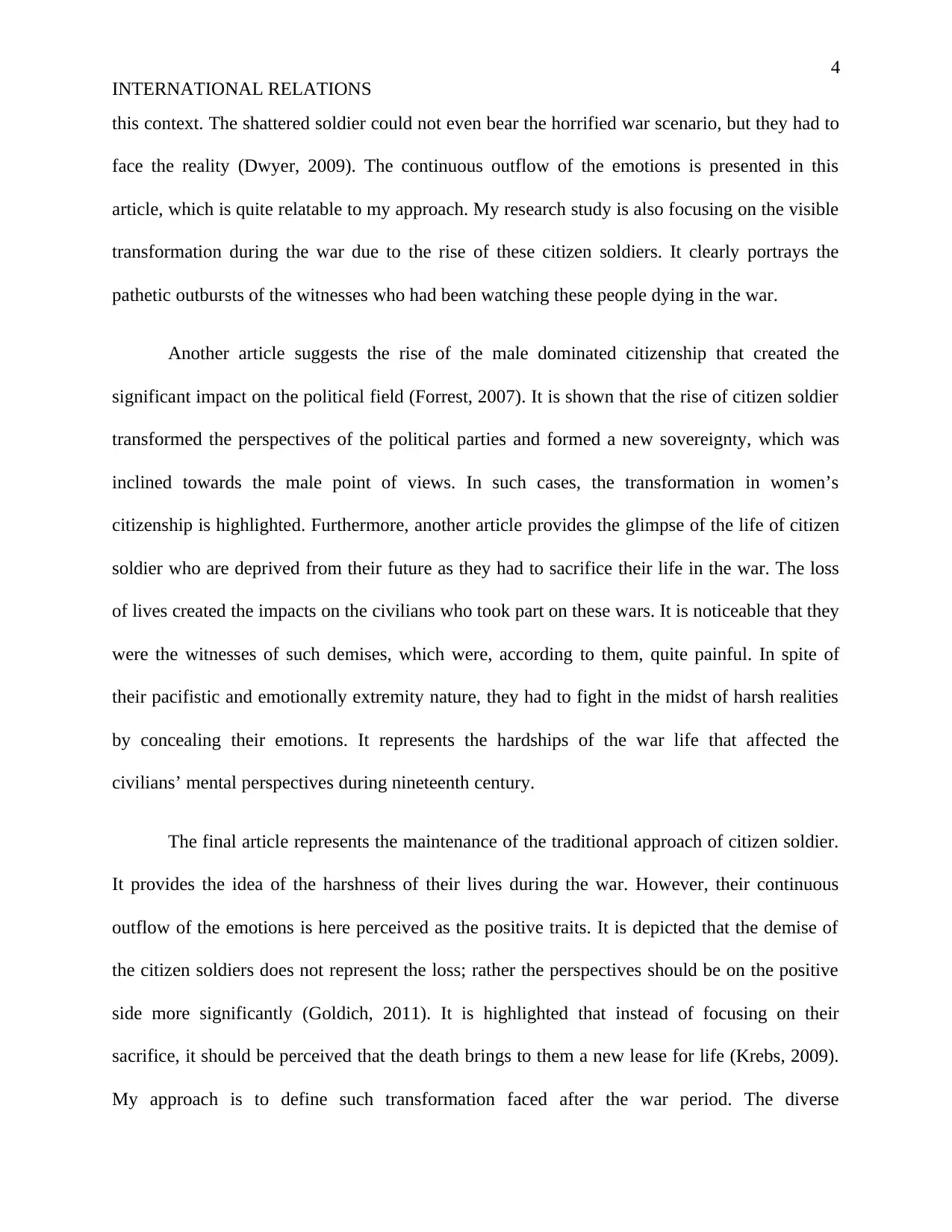
4
INTERNATIONAL RELATIONS
this context. The shattered soldier could not even bear the horrified war scenario, but they had to
face the reality (Dwyer, 2009). The continuous outflow of the emotions is presented in this
article, which is quite relatable to my approach. My research study is also focusing on the visible
transformation during the war due to the rise of these citizen soldiers. It clearly portrays the
pathetic outbursts of the witnesses who had been watching these people dying in the war.
Another article suggests the rise of the male dominated citizenship that created the
significant impact on the political field (Forrest, 2007). It is shown that the rise of citizen soldier
transformed the perspectives of the political parties and formed a new sovereignty, which was
inclined towards the male point of views. In such cases, the transformation in women’s
citizenship is highlighted. Furthermore, another article provides the glimpse of the life of citizen
soldier who are deprived from their future as they had to sacrifice their life in the war. The loss
of lives created the impacts on the civilians who took part on these wars. It is noticeable that they
were the witnesses of such demises, which were, according to them, quite painful. In spite of
their pacifistic and emotionally extremity nature, they had to fight in the midst of harsh realities
by concealing their emotions. It represents the hardships of the war life that affected the
civilians’ mental perspectives during nineteenth century.
The final article represents the maintenance of the traditional approach of citizen soldier.
It provides the idea of the harshness of their lives during the war. However, their continuous
outflow of the emotions is here perceived as the positive traits. It is depicted that the demise of
the citizen soldiers does not represent the loss; rather the perspectives should be on the positive
side more significantly (Goldich, 2011). It is highlighted that instead of focusing on their
sacrifice, it should be perceived that the death brings to them a new lease for life (Krebs, 2009).
My approach is to define such transformation faced after the war period. The diverse
INTERNATIONAL RELATIONS
this context. The shattered soldier could not even bear the horrified war scenario, but they had to
face the reality (Dwyer, 2009). The continuous outflow of the emotions is presented in this
article, which is quite relatable to my approach. My research study is also focusing on the visible
transformation during the war due to the rise of these citizen soldiers. It clearly portrays the
pathetic outbursts of the witnesses who had been watching these people dying in the war.
Another article suggests the rise of the male dominated citizenship that created the
significant impact on the political field (Forrest, 2007). It is shown that the rise of citizen soldier
transformed the perspectives of the political parties and formed a new sovereignty, which was
inclined towards the male point of views. In such cases, the transformation in women’s
citizenship is highlighted. Furthermore, another article provides the glimpse of the life of citizen
soldier who are deprived from their future as they had to sacrifice their life in the war. The loss
of lives created the impacts on the civilians who took part on these wars. It is noticeable that they
were the witnesses of such demises, which were, according to them, quite painful. In spite of
their pacifistic and emotionally extremity nature, they had to fight in the midst of harsh realities
by concealing their emotions. It represents the hardships of the war life that affected the
civilians’ mental perspectives during nineteenth century.
The final article represents the maintenance of the traditional approach of citizen soldier.
It provides the idea of the harshness of their lives during the war. However, their continuous
outflow of the emotions is here perceived as the positive traits. It is depicted that the demise of
the citizen soldiers does not represent the loss; rather the perspectives should be on the positive
side more significantly (Goldich, 2011). It is highlighted that instead of focusing on their
sacrifice, it should be perceived that the death brings to them a new lease for life (Krebs, 2009).
My approach is to define such transformation faced after the war period. The diverse
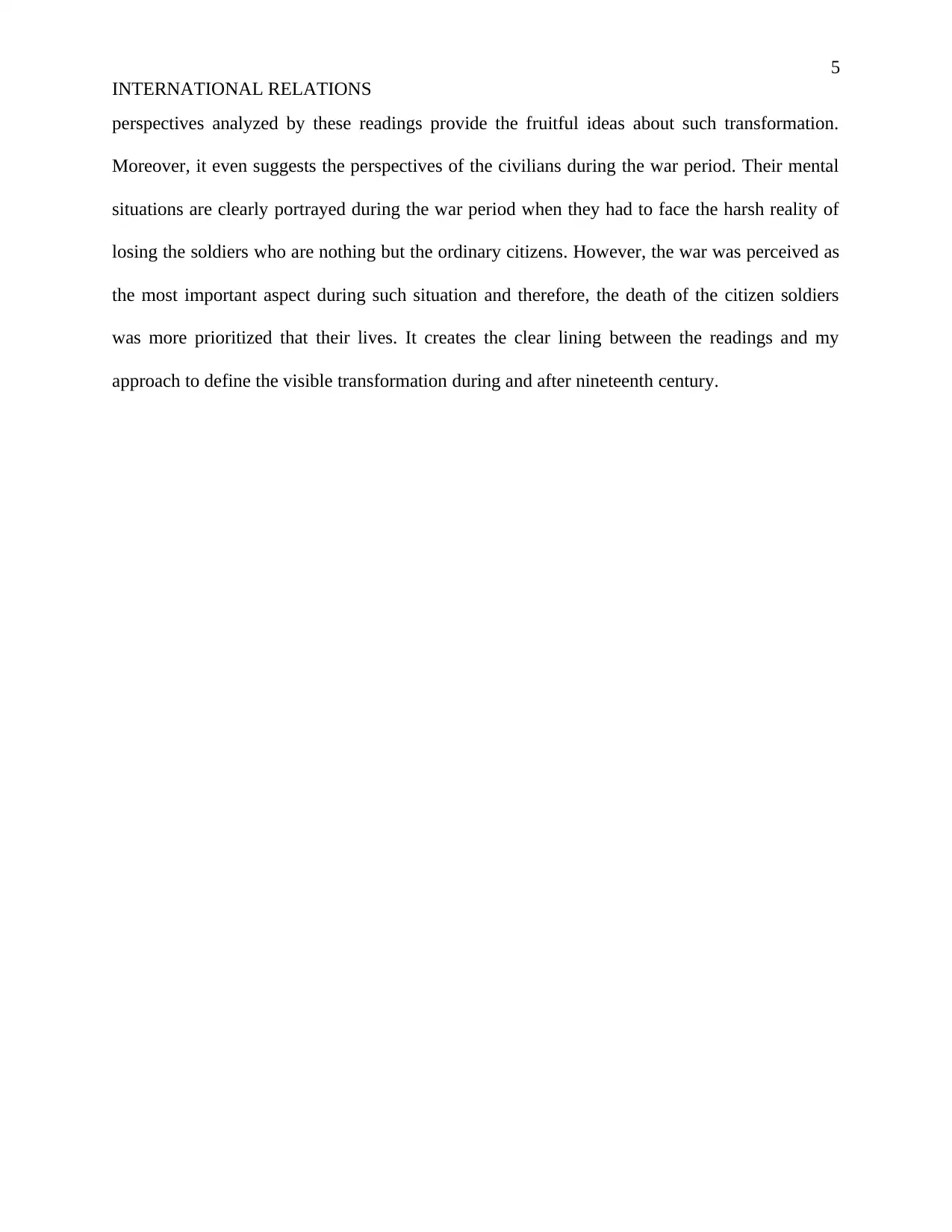
5
INTERNATIONAL RELATIONS
perspectives analyzed by these readings provide the fruitful ideas about such transformation.
Moreover, it even suggests the perspectives of the civilians during the war period. Their mental
situations are clearly portrayed during the war period when they had to face the harsh reality of
losing the soldiers who are nothing but the ordinary citizens. However, the war was perceived as
the most important aspect during such situation and therefore, the death of the citizen soldiers
was more prioritized that their lives. It creates the clear lining between the readings and my
approach to define the visible transformation during and after nineteenth century.
INTERNATIONAL RELATIONS
perspectives analyzed by these readings provide the fruitful ideas about such transformation.
Moreover, it even suggests the perspectives of the civilians during the war period. Their mental
situations are clearly portrayed during the war period when they had to face the harsh reality of
losing the soldiers who are nothing but the ordinary citizens. However, the war was perceived as
the most important aspect during such situation and therefore, the death of the citizen soldiers
was more prioritized that their lives. It creates the clear lining between the readings and my
approach to define the visible transformation during and after nineteenth century.
⊘ This is a preview!⊘
Do you want full access?
Subscribe today to unlock all pages.

Trusted by 1+ million students worldwide
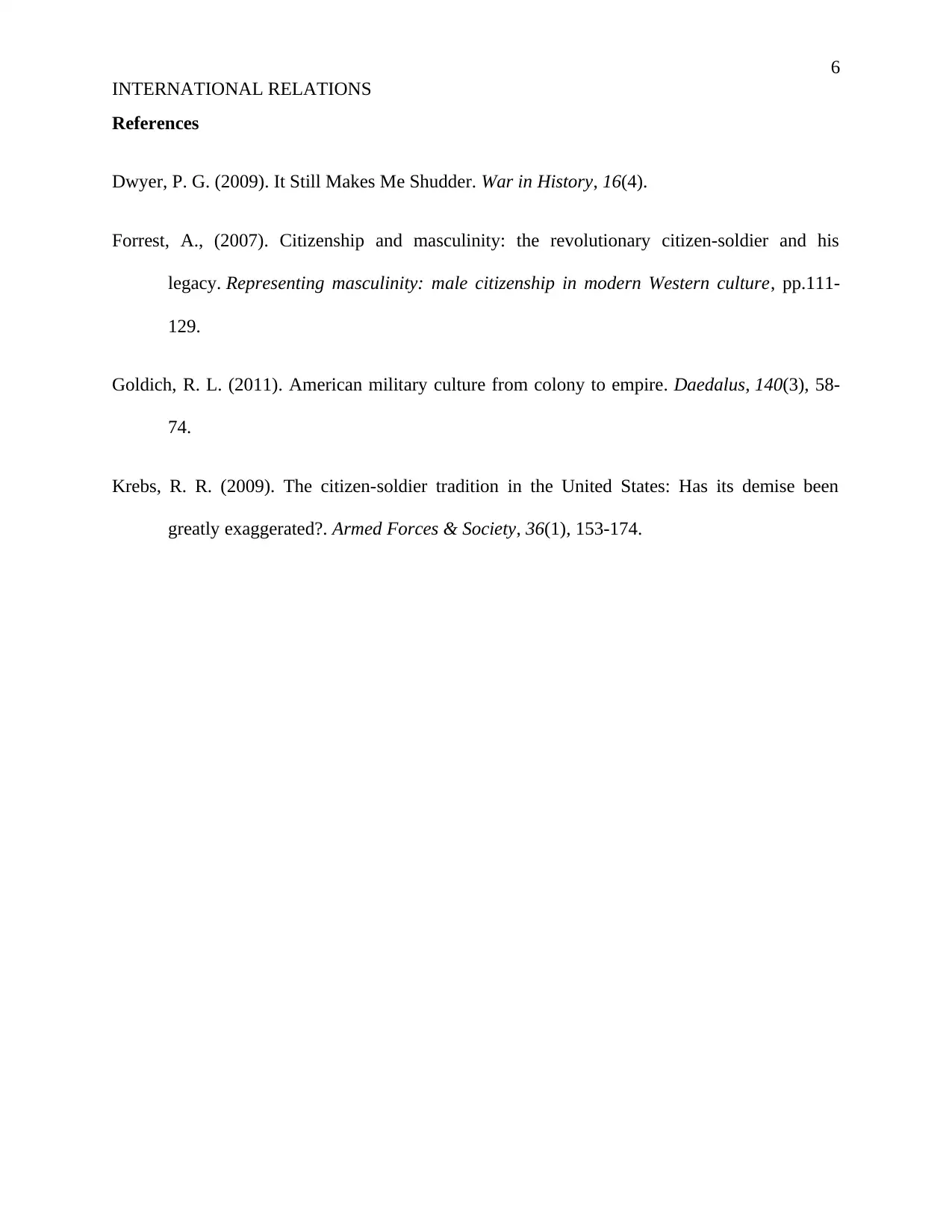
6
INTERNATIONAL RELATIONS
References
Dwyer, P. G. (2009). It Still Makes Me Shudder. War in History, 16(4).
Forrest, A., (2007). Citizenship and masculinity: the revolutionary citizen-soldier and his
legacy. Representing masculinity: male citizenship in modern Western culture, pp.111-
129.
Goldich, R. L. (2011). American military culture from colony to empire. Daedalus, 140(3), 58-
74.
Krebs, R. R. (2009). The citizen-soldier tradition in the United States: Has its demise been
greatly exaggerated?. Armed Forces & Society, 36(1), 153-174.
INTERNATIONAL RELATIONS
References
Dwyer, P. G. (2009). It Still Makes Me Shudder. War in History, 16(4).
Forrest, A., (2007). Citizenship and masculinity: the revolutionary citizen-soldier and his
legacy. Representing masculinity: male citizenship in modern Western culture, pp.111-
129.
Goldich, R. L. (2011). American military culture from colony to empire. Daedalus, 140(3), 58-
74.
Krebs, R. R. (2009). The citizen-soldier tradition in the United States: Has its demise been
greatly exaggerated?. Armed Forces & Society, 36(1), 153-174.
1 out of 7
Your All-in-One AI-Powered Toolkit for Academic Success.
+13062052269
info@desklib.com
Available 24*7 on WhatsApp / Email
![[object Object]](/_next/static/media/star-bottom.7253800d.svg)
Unlock your academic potential
Copyright © 2020–2026 A2Z Services. All Rights Reserved. Developed and managed by ZUCOL.
